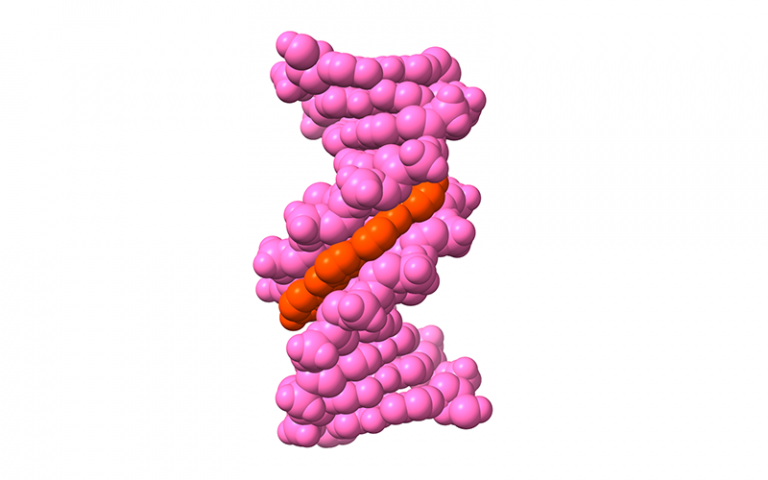Researchers develop entirely new antibiotic to treat gut infections
Research at UCL has enabled the development of a first-in-class precision antibiotic for the treatment of potentially life-threatening gut infections caused by Clostridioides Difficile.

12 April 2022
Clostridioides Difficile, often referred to as C. Diff., is a bacterium that causes infection in the large intestine. Mild infections cause diarrhoea and stomach cramping, but a significant minority of cases are severe and can result in dehydration, fever, kidney failure, toxic colon and sepsis.
People are often infected after a course of antibiotics when the body’s normal balance of gut bacteria is disrupted. Because of this, and because C. Diff survives easily outside the body for long periods, older and vulnerable people in hospitals or care settings are most at risk.
The UK has seen a dramatic reduction of C. Diff infections in the past fifteen years, from 55,498 cases in 2007-08 down to 13,283 in 2017-2018, a drop of 76%. Yet it remains a serious threat to already vulnerable patients in healthcare settings. Safe, targeted and effective C. Diff. antibiotics are essential to modern inpatient care.
A potential inhibitor of bacterial growth
The development first-in-class antibiotic ridinilazole is based on a body of work by Professors Stephen Neidle (UCL School of Pharmacy) and John Mann at Queen’s University Belfast. They discovered a novel class of compounds based on bis-benzimidazole (BBZs) that bind selectively to DNA and ultimately kill some cancer cells. A patent was granted in 2003 relating to the potential anticancer activity of BBZs.
On moving to the UCL School of Pharmacy in 2002, Stephen Neidle collaborated with microbiologist Professor Peter Taylor to investigate a new use of BBZs as potential inhibitors of bacterial cell growth.
Partnership with industry
These studies marked the beginning of the collaboration with Summit Therapeutics, a pharmaceutical company then based in Oxford, UK. In 2007, Summit and the UCL School of Pharmacy developed a joint strategy for the future development of BBZs as targeted treatments for C. Diff. infections. Focused studies showed that several of the BBZs which had been identified at UCL as safe for humans were effective against C. Diff, and Summit began optimising this compound and this resulted in the development of the drug SMT19969 (now called ridinilazole).
The clinical trials to develop ridinilazole have shown consistent improvements in patient outcomes when compared to the current standard treatment for C. Diff, vancomycin. These include better cure and reinfection rates, and improved quality of life and other indicators at an earlier point in treatment. Recent work has shown that ridinilazole protects the healthy gut microbiome more effectively than vancomycin, and that this helps prevent reinfection.
Multi-million-dollar investments
When Summit Therapeutics began work with the Neidle group in 2007, the company was a small biotech based in Oxford, UK. By December 2019, Summit had raised over $150 million of investment, with the major shareholder being billionaire entrepreneur Robert Duggan. Duggan, who is now CEO, himself invested $75 million to support the company’s Phase 3 Clinical Trials of ridinilazole. Summit is now an international Nasdaq-listed public company with three further pipeline streams and a proprietary discovery platform (Discuva), all focused on the development of novel antibiotics based on the success of ridinilazole.
Research synopsis
Innovative antibiotics enable safer and more effective treatments for C. Difficile gut infections
Research at UCL has enabled the development of a precision antibiotic for the treatment of easily transmitted and potentially life-threatening gut infections caused by Clostridioides Difficile. The development of this first-in-class antibiotic, ridinilazole, is strategically important to the pharmaceutical industry because it points the way to the discovery of new and better-targeted antibiotics. Partnering with UCL’s researchers to develop ridinilazole has allowed the pharmaceutical company Summit Therapeutics to grow from a small biotech company to a Nasdaq-listed international business by attracting over $150m in investment.
Links
- Professor Stephen Neidle’s academic profile
- Professor Peter Taylor’s academic profile
- UCL School of Pharmacy
- UCL Faculty of Life Sciences
- UCL Faculty of Life Sciences research - REF 2021
Image
- Caption: A ridinilazole analogue bound to DNA. Image credit: Stephen Neidle
 Close
Close

